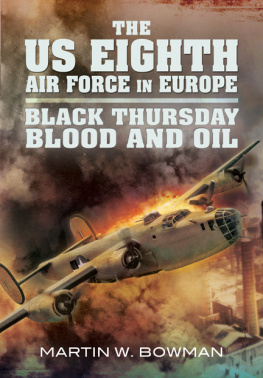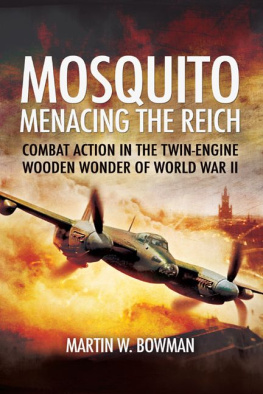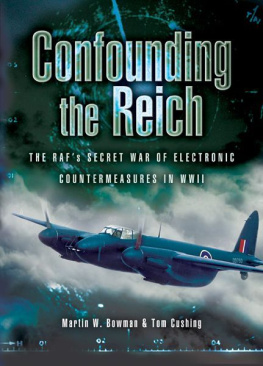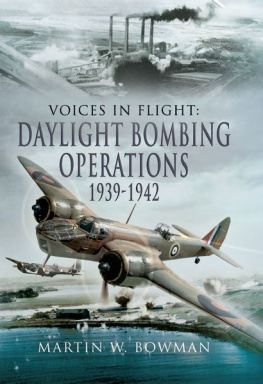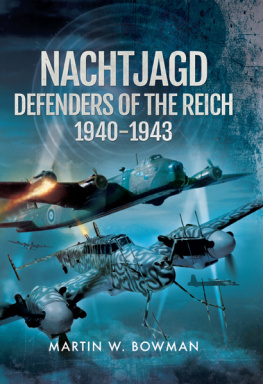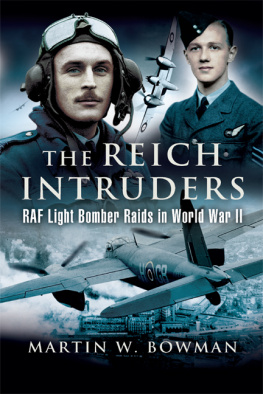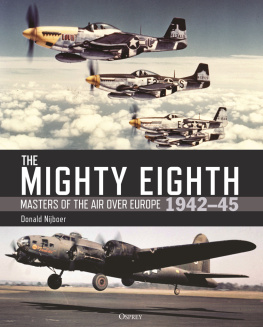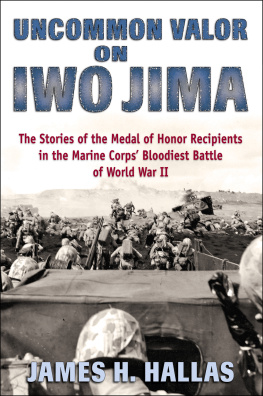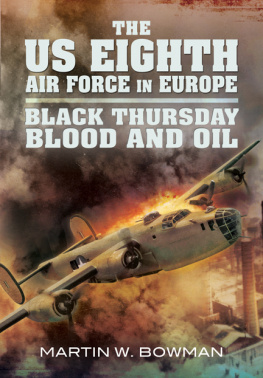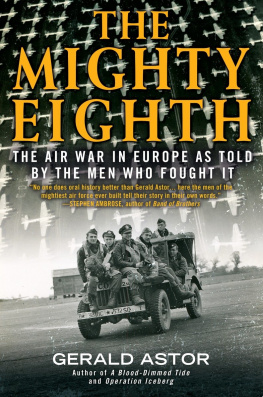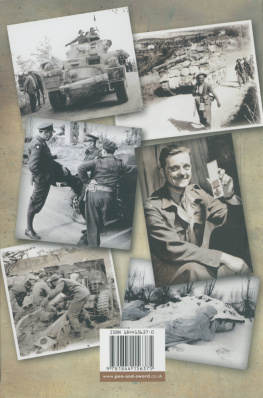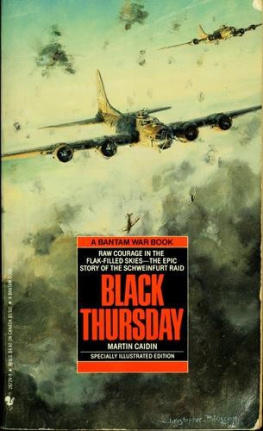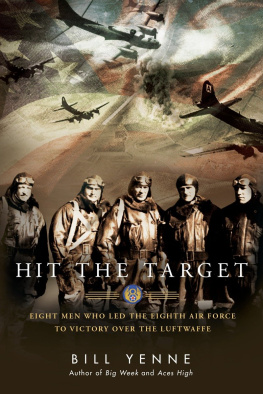First published in Great Britain in 2012 by
PEN & SWORD AVIATION
An imprint of
Pen & Sword Books Ltd
47 Church Street
Barnsley
South Yorkshire
S70 2AS
Copyright Martin Bowman 2012
ISBN 978 1 84884 747 7
eISBN 978 1 78337 864 7
The right of Martin Bowman to be identified as Author of this work has been asserted by him in accordance with the Copyright, Designs and Patents Act 1988.
A CIP catalogue record for this book is available from the British Library
All rights reserved. No part of this book may be reproduced or transmitted in any form or by any means, electronic or mechanical including photocopying, recording or by any information storage and retrieval system, without permission from the Publisher in writing.
Pen & Sword Books Ltd incorporates the Imprints of Pen & Sword Aviation,
Pen & Sword Family History, Pen & Sword Maritime, Pen & Sword Military,
Pen & Sword Discovery, Wharncliffe Local History, Wharncliffe True Crime,
Wharncliffe Transport, Pen & Sword Select, Pen & Sword Military Classics,
Leo Cooper, The Praetorian Press, Remember When, Seaforth Publishing
and Frontline Publishing
For a complete list of Pen & Sword titles please contact
PEN & SWORD BOOKS LIMITED
47 Church Street, Barnsley, South Yorkshire, S70 2AS, England
E-mail: enquiries@pen-and-sword.co.uk
Website: www.pen-and-sword.co.uk
Contents
C HAPTER 1
The Raid That Failed
Double, double, toil and trouble;
Fire burn and cauldron bubble.
Macbeth, Act IV
Captain Bill Cameron was slightly puzzled. And the twenty-three-year old pilot from California was not alone. After six months of combat operations in very cold and hostile winter skies over Europe, the combat crews at Shipdham were told that for the time being, at least, there would be no combat. And it was springtime. The Eightballers did not understand then that this relatively pleasant interval was designed to prepare them for an exceptional mission, one that would put it on the line for all of them. There were new crews and new B-24Ds to replace those that had been lost and losses had been severe. Fate had spared Cameron. In the words of Ernie Pyle it could be said that, He is a fugitive from the law of average. He was the only remaining pilot originally assigned to the 67th Squadron, which had lost five of its original nine crews including his own. After the loss of Little Beaver on 14 May 1943 Cameron was made an aircraft commander and with Lieutenant Bill Dabney, an American transfer from the RAF, a new crew was formed. They were given a new Liberator, which Cameron christened Buzzin Bear . The name was partly inspired by the grizzly bear, which first adorned his home states flag in 1846. Also, Cameron was a product of UC Berkeley, The Golden Bears. Buzzing or low flying was a popular trait among pilots. If he got through his next few missions Cameron knew that he would be able to return home; to Hanford, not far from the central Pacific coast that stretches from the Monterey Bay south through Big Sur to San Luis Obispo Bay. In his novels John Steinbeck immortalized Montereys Cannery Row and the Salinas Valley. Henry Miller, another author who found a home on the Central Coast, called this place a paradise. Cameron would one day make his home here in Carmel with wife, Alison, one of General Vinegar Joe Stillwells daughters after a combat career that stretched to twenty-nine months and thirty-eight missions and would be equalled by few in the 8th Air Force. Courage and compassion were characteristics that Cameron combined throughout his long combat performance.
The Flying Eightballs were shifted, without explanation, to low-level formation practice over the green fields of East Anglia. It was the same story at Hethel and Hardwick. Between 11 and 25 June 1943 the 389th flew into their base at Hethel, just outside Norwich, to begin low level training alongside the Flying Eightballs and the Travelling Circus. Colonel Jack W. Wood, the thirty-six-year-old 389th CO, a veteran pilot from Fairbault, Minnesota, who had graduated from Flight School in 1928, was under pressure to get his group operational. A temporary ground echelon was seconded to Hethel pending the arrival of the regular ground personnel. After a five-day orientation course crews began flying low-level practice missions over East Anglia at less than 150 feet en route to their target range over the Wash. Rumour and speculation increased as ground crews sweated to remove the Norden bombsights and replace them with low-level sights. Heavier nose armament and additional fuel tanks in the bomb bays gave the men clues as to their new role. Since everything was Top Secret wrote Tommie Holmes, we were told only that we were going to Libya. Only higher headquarters knew what was in the offing. Early in June General Brereton was informed that the three Groups would be joining his 98th Pyramiders and 376th Liberandos Bomb Groups for a second attack on the important strategic oilfields at Ploesti in Romania, which produced 60 per cent of all Germanys needs. By increasing the Liberators fuel capacity to 3,100 gallons they could just make it to the target from North Africa.
At Hardwick, Colonel Addison Baker led his Liberators flying wing tip to wing tip at 150 feet over the hangar line on the base, which served as a target. On some days the 44th and the 389th joined the Travelling Circus in flights over the base in waves of three aircraft. Crews had been trained in the art of high-altitude precision bombing and were quite unused to low-level flying. On 25 June two 389th Liberators were involved in a midair collision. One made it back to Hethel but the other crash-landed and one man was killed. When they departed for North Africa at the end of June the 389th, the youngest and most inexperienced of the three Groups, had completed only two weeks training in Norfolk.
By 25 June forty-one Liberators were available at Shipdham for the Ploesti mission, which was codenamed Operation Statesman . Five days later the three groups began their flight to North Africa via Portreath in Cornwall. Forty-two B-24s took off from Hardwick and thirty more left the runways at Hethel. However, a few 389th aircraft remained behind in Norfolk for training and air-sea-rescue duties. For the 93rd the long overseas flight meant a return to the African desert they had forsaken in February 1943. The 124 Liberators flew to Libya, where they came under the control of the 9th Air Force. After weeks of preparation the Eightballs took off singly early one dark morning and flew, at very low altitude, to an airfield in the southern part of England. The next day, they crossed the Bay of Biscay, again low enough to escape German radar and passed through the Straits of Gibraltar to Oran in Algeria. The Oklahoman , which was flown by twenty-four-year-old Lieutenant John Jack C. Martin Jr, was commandeered by Colonel Jack Wood when his aircraft lost an engine and went with the rest of the Group to Benina Main, one of Mussolinis former airfields, fifteen miles from the coastal city of Benghazi. This left Jack Martins crew in Oran with an engine change to do. The Oklahoman , whose insignia was an Indian maid, sitting on top of a covered wagon, was named by Martin, who though he was born in Richmond, Virginia, was educated in Tishomingo, Oklahoma, graduating from high school there in 1937 and from the Murray State School of Agriculture in 1939. Before enlisting in the AAC he was a printer and photo-engraver on the Madill Record . He had met Vae Hogan at Lowry Field where she was a lieutenant in the Station hospital and they married on 25 May 1943 just before he left for overseas duty. Martins kid brother was a private first class with the marine paratroopers in the south Pacific. By the time Martin and his crew arrived at Benina in Colonel Woods aircraft the 389th would have flown four combat missions.

